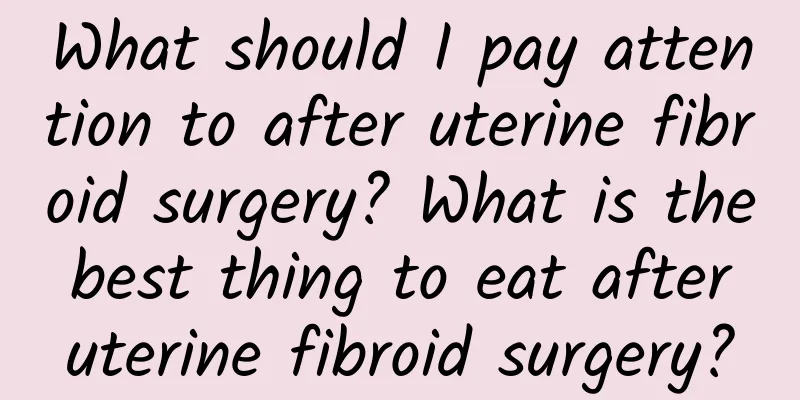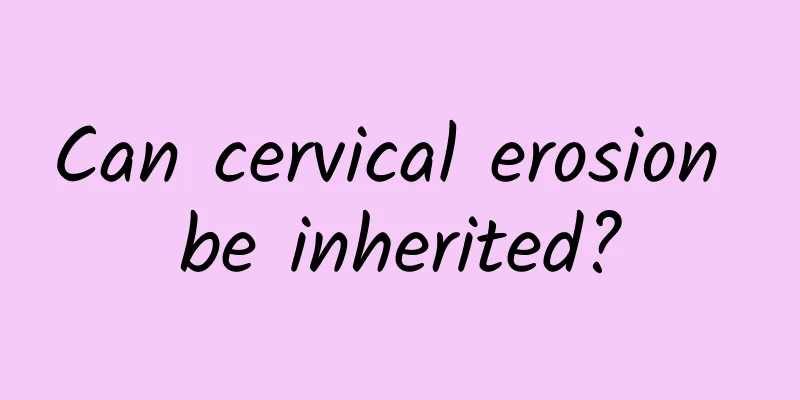What should I pay attention to after uterine fibroid surgery? What is the best thing to eat after uterine fibroid surgery?

|
This sentence should be used for human health issues. If you have uterine fibroids, it is essential to go to the hospital for examination and treatment. Knowing some basic knowledge can be well understood. Talk with medical experts and many women with uterine fibroids to find the right treatment for uterine fibroids, advocate the concept of prevention and auxiliary treatment, and talk about uterine fibroid health care: precautions after uterine fibroid surgery. Precautions after uterine fibroid surgery 1. Nursing methods after uterine fibroid surgery encourage more turning over or bedside activities to promote the discharge of gas in the body and prevent flatulence. Keep the wound clean and dry. If there is exudate, notify the nursing staff immediately to change the gauze. If you feel any pain in the wound, tell the nurse and they can give you painkillers as prescribed by the doctor. After the gas is discharged, you can eat a light diet, such as white porridge, green vegetables, etc. Do not eat gas-producing foods to prevent bloating, such as milk, beans, etc. The urinary catheter can be removed on the second day after surgery, and the patient can urinate on his own within 5 hours. It is recommended to eat high-protein, high-iron, and high-fiber foods such as cherries, grapes, fish soup, and vegetables after exhausting gas to prevent constipation and promote wound healing. Abdominal pressure should be avoided when getting out of bed, such as bending over, squatting, climbing stairs, riding a bicycle, etc. Wipe from front to back after using the toilet to avoid infection. Precautions after uterine fibroid surgery 2. Home care and precautions after uterine fibroid surgery. There will be no menstruation for 6-8 weeks after hysterectomy surgery. If the deep tissue in the pelvis recovers, you can avoid normal sexual life, lifting more than 3 kg, bending over to pick up objects, and climbing stairs within 6-8 weeks after surgery. Belly bands can be used appropriately. Do not sit for long periods of time or travel long distances within one month. Avoid yoga, rhythmic dance and other exercises that can easily increase abdominal pressure to avoid pelvic bleeding. After going to the toilet, wipe from front to back to avoid infection. Observe whether the wound is red, swollen, hot, painful or has abnormal secretions. If you have the above symptoms, please return to the hospital as soon as possible. Eat more fruits, vegetables and high-fiber foods, drink 2000-3000cc of water every day, if you have bilateral oophorectomy to prevent constipation, osteoporosis is prone to occur, and calcium and hormone intake should be increased, such as: animal bones, dried fish, soy foods and appropriate exercise, avoid vaginal douching, take a bath and consume more protein, vitamins and iron foods, such as: fish soup, grapes, cherries, vegetables, etc. There are no special dietary taboos, but try to eat less irritating and gas-producing foods. |
>>: Can I still get pregnant after uterine fibroid surgery? Is uterine fibroid a malignant tumor?
Recommend
Irregular menstruation causes spots and acne
Regarding the causes of irregular menstruation, e...
What are the clinical manifestations of irregular menstruation?
Menstrual disorders, also known as irregular mens...
Life expectancy for severe cervical precancer
Cervical precancerous lesions are highly aggressi...
Can pelvic effusion cause abdominal pain?
Can pelvic effusion cause abdominal pain? After s...
What are the causes of grade I cervical erosion? Three major causes can easily induce grade I cervical erosion
Cervical erosion is a very common disease, which ...
Introducing effective methods to prevent vaginitis in spring
Many people want to know the effective ways to pr...
Best treatment for bacterial vaginosis
I believe that many friends are familiar with bac...
What is uterine fibroid bleeding? What are the symptoms of uterine fibroid bleeding?
What is uterine fibroid bleeding? Uterine fibroid...
3 ways to treat chronic cervicitis 4 life precautions for chronic cervicitis
Chronic cervicitis is a common gynecological dise...
What are the symptoms of postmenopause in women? Pay attention to these after menopause
What are the symptoms of postmenopause in women? ...
Can vulvar leukoplakia be cured? How should it be treated?
Vulvar leukoplakia is a disease that can be cured...
What are the folk prescriptions for elderly people's drooling?
There is no folk prescription for treating drooli...
Several common symptoms of vaginal candidiasis
It is understood that many female friends suffer ...
Losing weight by eating vegetarian food is not difficult! 4 tips to change the way you cook
Is it easier to lose weight by eating vegetarian ...
What are the causes of adnexitis?
There are more and more patients with adnexitis i...









